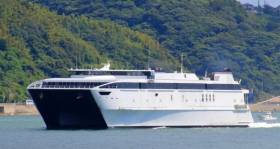Displaying items by tag: Westpac Express
Irish Continental Group to Sell High-Speed Craft 'Jonathan Swift'
#FerryNews - Irish Continental Group (ICG) announced today they are to sell their high-speed craft 'Jonathan Swift' which has served the Dublin-Holyhead for almost two decades to a Spanish operator.
ICG the Dublin based group (parent company of Irish Ferries) has entered into a memorandum of agreement (MOA) regarding the sell of the craft with Balearia Eurolineas Maritimas S.A.
In the statement from ICG, the agreed consideration of €15.5 million less brokers commission is payable in cash on delivery less a 10% deposit to be held in escrow. The HSC is to be delivered to the Mediterranean ferry company by the end of April this year.
Jonathan Swift which was commissioned by and delivered to ICG in 1999 has exclusively operated on the company's service between Dublin and Holyhead.
Afloat adds the HSC which is marketed as the 'Dublin Swift' is as previously reported undergoing routine drydocking in the UK (see piece focusing on Isle of Inishmore). According to the Irish Ferries website, Jonathan Swift is scheduled to return to service next week on Monday 5 February.
A replacement HSC adds ICG will come from their fleet by the 2001 built HSC 'Westpac Express' (acquired in 2016) which was recently redelivered following a period of twenty months on external charter. The HSC is currently undergoing a refurbishment programme to bring her up to Irish Ferries passenger service standards.
The Jonathan Swift as delivered to the group in 1999 at a cost of €38.8m. The disposal will generate a book profit for ICG of approximately €14.0m.
The proceeds will be used for general corporate purposes.
Irish Ferries Owner Acquire Fast-Ferry for $13.25m
#ICGbuyFerry - Irish Continental Group (ICG), parent company of Irish Ferries has agreed a deal to buy a high-speed vessel known as the “Westpac Express” for $13.25 million.
The Irish Times reports that ICG expects to take ownership of the fast-ferry from current owner Bali Westpac by late May.
Upon delivery, the vessel is to be bareboat chartered to the company Sealift for a firm period of four months with four further one year option periods and a final seven month option at the charterer’s option.
The Westpac Express was built in 2001 by Austal Ships. It has a gross tonnage of 8,403 tonne, passenger capacity of 900 and a car carrying capacity of 182 units.




























































